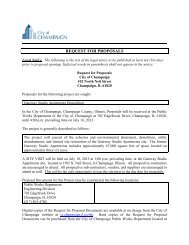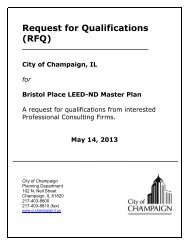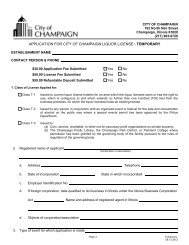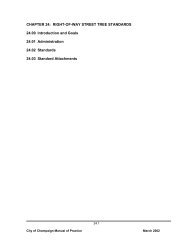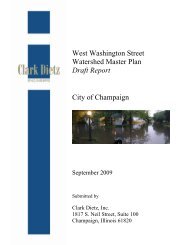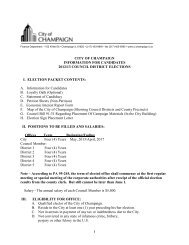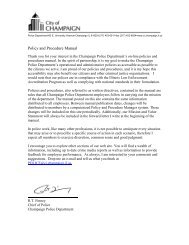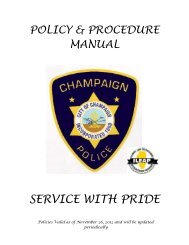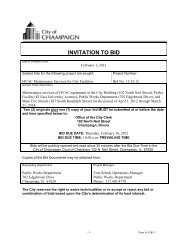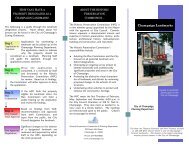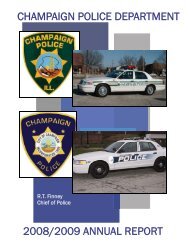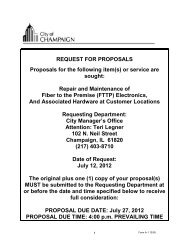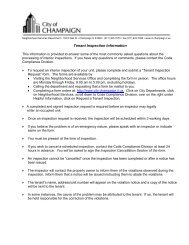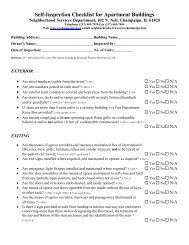2010-2014 Consolidated Plan - City of Champaign
2010-2014 Consolidated Plan - City of Champaign
2010-2014 Consolidated Plan - City of Champaign
Create successful ePaper yourself
Turn your PDF publications into a flip-book with our unique Google optimized e-Paper software.
Activities:1) Targeted Full Home Improvement Program: 5-10 projects per year (25-50 for five-year planperiod). This is a whole house rehab program targeted to low- and moderate-income owneroccupiedhouseholds in <strong>Plan</strong>ning Areas 1, 2, 4, 7, 8, 9, and 14 where property values (adjusted forsize <strong>of</strong> unit) are below <strong>City</strong> average and/or the overall housing condition is rated as preservation orrestoration. Income-eligible property owners in other <strong>Plan</strong>ning Areas may also be assisted. Thepurpose <strong>of</strong> the program is to improve the quality <strong>of</strong> the housing stock by bringing units intocompliance with applicable code requirements, eliminating lead-based paint hazards, applyingenergy efficiency and improving exterior appearance to achieve maximum neighborhood impact.(FY 10/11 Budget: $100,000 HOME, $25,000 match)2) <strong>City</strong>wide Emergency Repair Program: 30-35 projects per year (150-175 for five-year plan period).This program addresses repairs <strong>of</strong> an urgent nature that threaten the health and safety <strong>of</strong>occupants. Addressing isolated repairs as they occur prevents the further deterioration <strong>of</strong> thehousing stock. Eligible households include low- and moderate-income owner-occupants. (FY10/11 budget: $152,500 CDBG)3) Credit Counseling for Rehab Programs: 5-10 clients per year (10-50 for five-year plan period).The <strong>City</strong> <strong>of</strong>fers credit counseling opportunities to all housing rehab applicants that cannot qualifydue to credit problems. Applicants can participant in counseling provided by a non-pr<strong>of</strong>it through acontractual arrangement with the <strong>City</strong> or an accredited agency <strong>of</strong> their own choosing. The <strong>City</strong>’scurrent contract for credit counseling is with the Central Illinois Debt Management and CreditEducation, Inc. (FY 10/11 Budget: $2,000 CDBG)b) Improve the condition <strong>of</strong> rental properties in the <strong>City</strong>’s low- and moderate-incomeneighborhoods. 53% <strong>of</strong> the <strong>City</strong>’s housing stock is rental property. Much <strong>of</strong> the affordable rentalproperty is located in the lower income neighborhoods which contain the oldest housing stock in the<strong>City</strong>. Private investment has not been enough to keep these units well-maintained. Additional publicfunding is required to ensure that the <strong>City</strong>’s rental properties continue to provide a viable source <strong>of</strong>affordable housing for low- and moderate-income families.Activities:1) Rental Rehabilitation Program: Bring 1-2 units per year (5-10 per five-year plan period) into codecompliance. This program provides matching funds for the renovation <strong>of</strong> rental housing stock. Tobe eligible for the program, rental units must be affordable to households at 65% <strong>of</strong> median familyincome. Property owners must match the <strong>City</strong>’s investment in the units at a level to bedetermined. Repairs will focus on code requirements, removal <strong>of</strong> lead paint hazards, and exteriorrepairs that provide an overall neighborhood improvement benefit. In the initial years <strong>of</strong> theprogram, the HOME rents presented a challenge for most landlords and the utilization rate <strong>of</strong> theprogram was lower than expected. No new funds are allocated during FY 10/11 but previousyears’ allocations will be available.2) Apartment Safety Program: The <strong>City</strong> will require systematic inspection <strong>of</strong> common areas inapartment buildings with 3 or more housing units throughout the <strong>City</strong>. Properties are inspected forcompliance with the fire prevention code on a 3-year cycle. During <strong>of</strong>f-years, property owners willbe required to file a self-inspection checklist with the <strong>City</strong> to assure that fire prevention systemsare operable and fire safety issues have been addressed.3) Tenant Education: Work with the Tenant Union to provide education to tenants and landlordsabout their rights and responsibilities during the annual Community Reinvestment Group HousingFair.72 Strategic <strong>Plan</strong>: Affordable Housing



